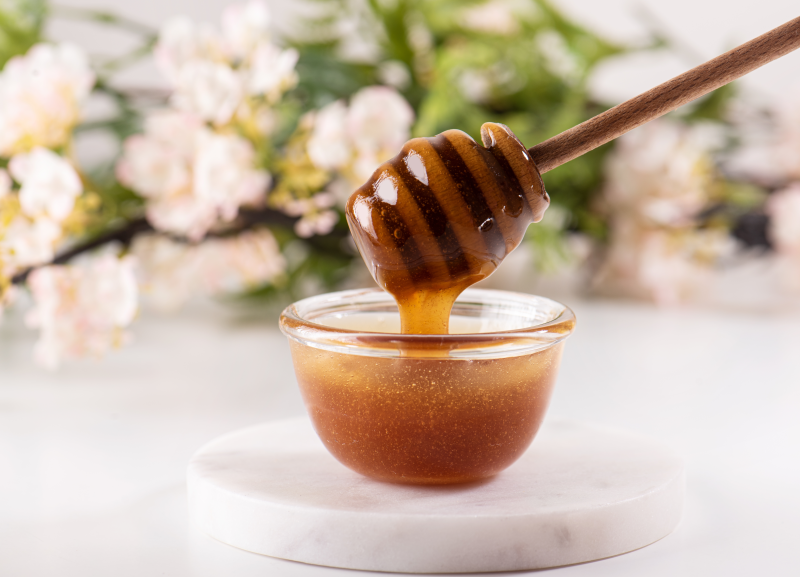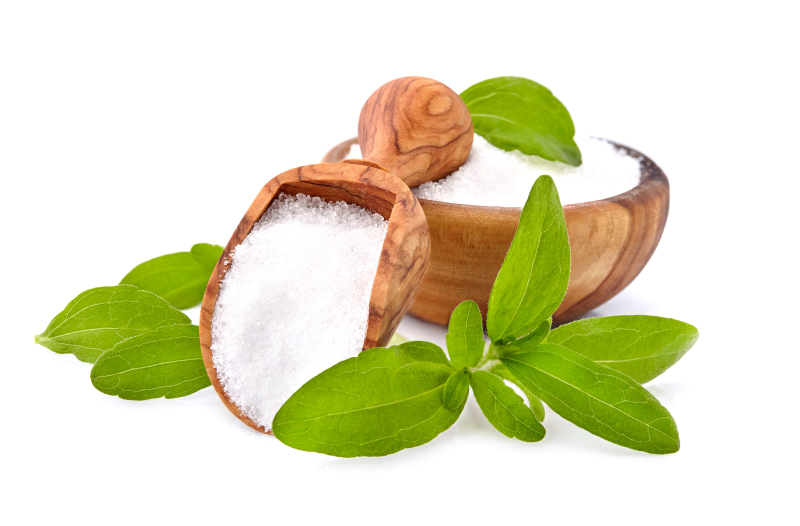At a glance
Honey is a natural sweetener rich in phytonutrients and trace minerals, but it’s not keto-friendly. Even small amounts can raise blood sugar and disrupt ketosis, making low-carb alternatives a better choice for those following a ketogenic lifestyle.
Honey is a popular sweetener widely used in baking, marinades, glazes, and dressings. But is honey keto-friendly?
No, honey isn’t keto-approved due to its high concentrations of natural sugars that raise blood glucose and insulin levels and can quickly kick you out of ketosis.
Discover the pros and cons of using honey on a ketogenic diet and learn about the best low-carb sugar substitutes.
Is honey keto-friendly?
Though honey is a common kitchen staple used to sweeten beverages or drizzle on pastries and breakfast foods, it isn’t keto-friendly.
A single serving, or one tablespoon, of honey contains around 20 grams of carbohydrates.
Considering that most individuals following a Healthy Keto® diet limit carb intake to no more than 20 to 50 grams of net carbs daily, honey can quickly use up or exceed this limit, making it unsuitable for a low-carb diet.
In addition to avoiding natural honey, keto dieters are also discouraged from consuming high fructose corn syrup and table sugar, which can significantly spike blood sugar levels and disrupt ketosis.
Honey nutrition facts
The nutritional value of honey can vary based on its source. For instance, raw honey generally contains more nutrients and natural sugars compared to processed honey.
However, despite these differences, most honey products are high in carbohydrates, which makes them incompatible with a keto diet.
According to data from the U.S. Department of Agriculture (USDA), one tablespoon of natural honey contains:1
- 64 calories
- 0 g total fat
- 0 g protein
- 17 g total sugars
- 17 g total carbs
- 0 g fiber
- 17 g net carbs
While high in carbohydrates, raw honey is a rich source of beneficial vitamins, minerals, and phytonutrients that may support strong immune defenses and overall health.
Honey is a good source of various nutrients, including:
- Vitamin C
- B vitamins
- Vitamin K
- Calcium
- Copper
- Iron
- Magnesium
- Manganese
- Phosphorus
- Potassium
- Zinc
Watch the video below to learn if honey is a good substitute for sugar.
Should you have honey on keto?
Keto dieters should avoid using honey as it’s considered a complete carbohydrate, which means it contains no fiber to buffer blood sugar spikes.
Eating sugary foods such as honey can make it more challenging to enter ketosis, lose weight, and achieve your health goals.
In addition, it’s crucial to avoid processed foods that contain honey, such as honey mustard, honey-flavored sauces, and certain dressings, as they often contain hidden carbs that can easily derail a keto diet.

Benefits of manuka honey
Although honey isn’t keto-friendly, those with seasonal allergies, a persistent cough, or a sore throat may benefit from consuming medicinal honey periodically.
Unprocessed, natural honey has potent antibacterial, antiviral, anti-inflammatory, and antimicrobial properties, which can support the body’s fight against illness and infection.
Manuka honey is a raw, viscous honey originating from New Zealand. It’s produced by bees that gather pollen from the blooms of the manuka bush, creating honey with impressive health benefits.
Manuka honey’s health-promoting properties are attributed to methylglyoxal, a sugar compound that can disrupt microbial membranes and proteins and help destroy bacteria, including Staphylococcus aureus and Escherichia coli.
While regular honey contains small amounts of methylglyoxal, manuka honey boasts the highest concentration of this natural compound.
A study published in AIMS Microbiology concluded, “Manuka honey’s antibacterial activity is due to a higher phenolic and methylglyoxal content. Manuka honey can be safely used as an alternative natural antibiotic, which exerts a stimulating effect on macrophages to release mediators needed for tissue healing and reducing microbial infections.”2
Methylglyoxal and other compounds found in manuka honey, such as hydrogen peroxide, have also been shown to promote wound healing, ease digestive disorders, fight skin infections, and soothe throat irritation.
One of the best ways to benefit from manuka honey’s health benefits is by incorporating it into a natural antibiotic drink using garlic, lemon juice, turmeric, ginger, olive oil, and apple cider vinegar.
Downsides of consuming honey
Honey is composed primarily of two simple sugars: glucose and fructose.
Though fructose is low on the glycemic index, meaning it raises blood glucose more slowly, honey’s high carbohydrate and sugar content can still lead to significant spikes in blood sugar and insulin levels.
Chronically elevated blood sugar and insulin levels are a major contributing factor for metabolic diseases, including diabetes, obesity, and insulin resistance.
In addition, excess fructose can overwhelm the liver’s capacity to process this sugar, triggering its conversion into fatty acids. This explains why fructose consumption increases the risk of non-alcoholic fatty liver disease (NAFLD).
NAFLD occurs when fat builds up in the liver, leading to inflammation and potential liver damage. Over time, this condition can progress to more severe forms of liver disease, including fibrosis and cirrhosis.
“The liver is the only organ that can metabolize honey,” explains Dr. Berg. “Large amounts of fructose can damage the liver, worsen insulin resistance, and contribute to fatty liver disease.”
A study published in the International Journal of Molecular Sciences found that the overconsumption of fructose is directly linked to inflammation and insulin resistance and is associated with an increased risk of liver disease.3

Keto-friendly sugar substitutes to use
Pure maple syrup, agave nectar, and honey are often used as natural sugar substitutes. However, these alternatives contain too many carbs and sugars to be suitable for a keto diet.
Those looking for a low-carb honey substitute should consider keto-friendly alternatives such as xylitol, monk fruit, erythritol, and stevia.
These sugar-free honey alternatives naturally occur in various fruits, vegetables, and plants and have minimal or no effect on blood glucose and insulin levels.
Xylitol and erythritol are sugar alcohols derived from plants and yeast. They offer a sweetness similar to refined sugar without significantly affecting blood sugar balance.
Monk fruit sweetener is derived from a fruit native to Southeast Asia and is up to 250 times sweeter than cane sugar. It’s available in liquid or powdered form, including as a zero-sugar honey substitute with a similar thickness and texture to maple syrup.
Stevia is another keto-friendly natural sweetener derived from the Stevia rebaudiana plant. It’s approximately 400 times sweeter than sugar, and only small amounts are needed to sweeten foods and beverages.
Key takeaways
- Honey isn’t keto-friendly because its high fructose and glucose content can raise blood sugar and insulin levels, halting ketosis.
- Manuka honey, although nutrient-rich and potentially beneficial in small amounts for seasonal allergies, remains too high in carbohydrates for regular use on a keto diet.
- To maintain ketosis while satisfying a sweet craving, choose keto-approved alternatives such as stevia, monk fruit, xylitol, or erythritol.
FAQ
1. Is honey keto-friendly?
No, honey isn’t keto-friendly. It’s high in fructose and glucose, which can elevate blood sugar and insulin levels and may adversely affect liver function.
2. How much honey is okay on keto?
Honey shouldn’t be included in a keto meal plan due to its high sugar and carb content.
However, small amounts of manuka honey, used occasionally in natural remedies such as a homemade antibiotic drink, can help alleviate seasonal allergies and may boost the immune system.
3. What is a substitute for honey on keto?
Monk fruit syrup is an excellent keto-friendly honey substitute that works well for sweetening teas, pastries, and baked goods. It has a similar consistency and thickness to honey and can be used in your favorite keto recipes without spiking your blood sugar levels.
4. What sweetener is keto-friendly?
Stevia, erythritol, monk fruit, and xylitol are keto-friendly substitutes for honey. Unlike honey and artificial sweeteners, these sugar alternatives have minimal effects on blood sugar and insulin balance, making them suitable for a low-carb diet.
5. What is the healthiest type of honey?
Raw manuka honey is considered the most nutrient-dense honey. It also contains antiviral, anti-inflammatory, and antioxidant compounds that support immune functions and promote overall health.
Additionally, manuka honey contains high concentrations of methylglyoxal, which has powerful antibacterial properties linked to enhanced wound healing and better digestive function.
Sources
- https://fdc.nal.usda.gov/fdc-app.html#/food-details/169640/nutrients ?
- https://www.ncbi.nlm.nih.gov/pmc/articles/PMC6613335/ ?
- https://www.ncbi.nlm.nih.gov/pmc/articles/PMC8267750/ ?


















